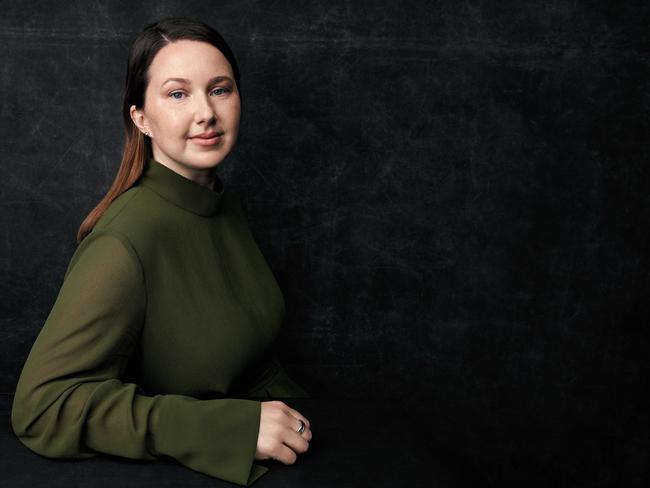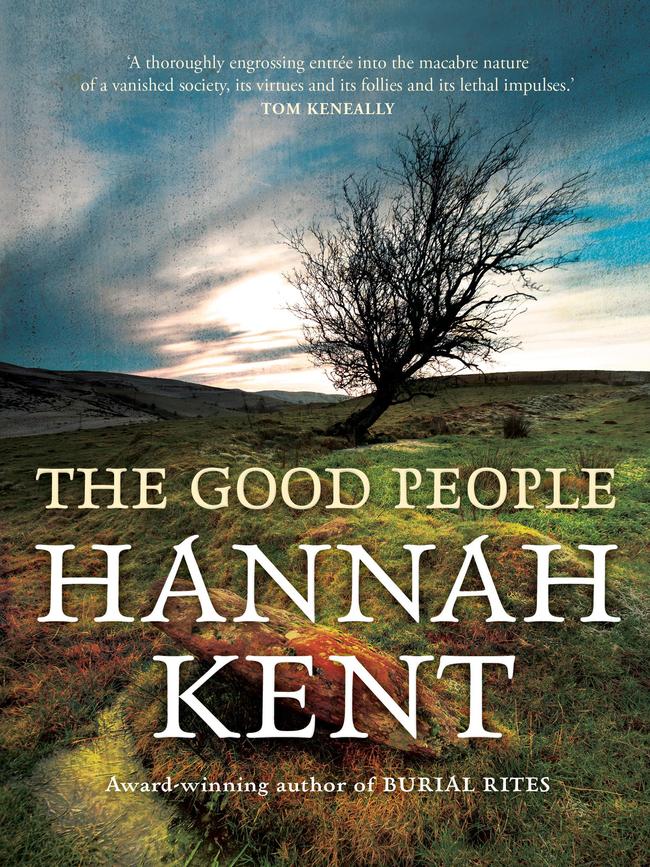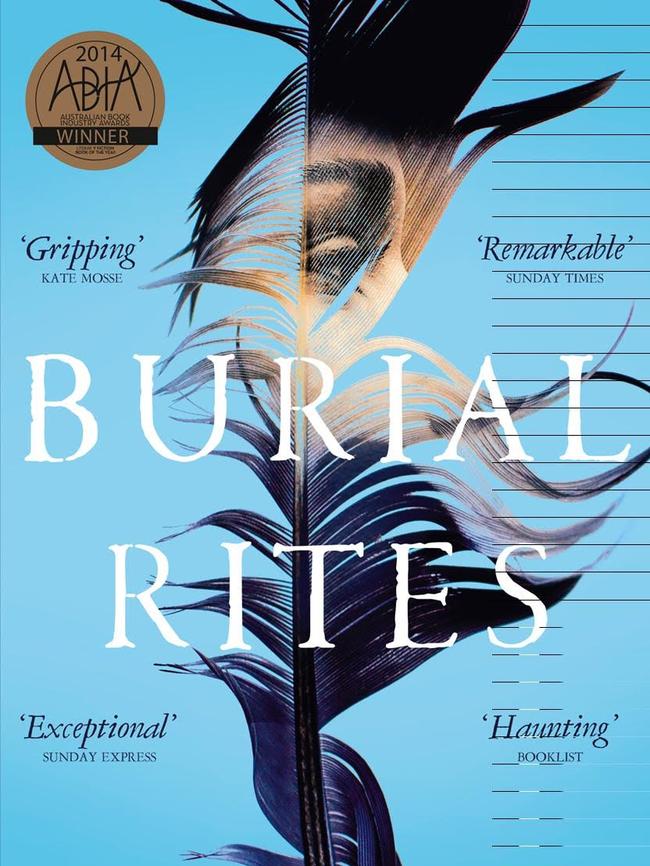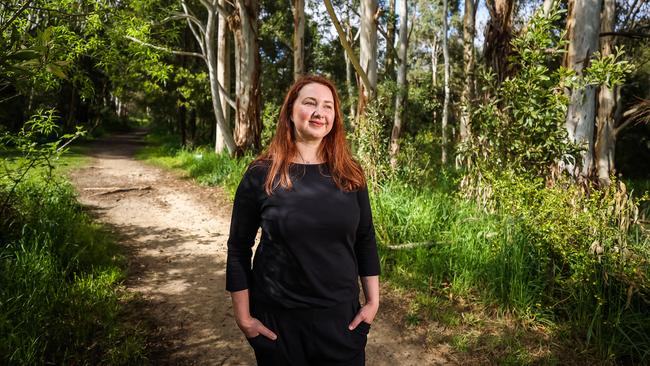How Hannah Kent found herself in the middle of a million-dollar bidding war
Acclaimed South Australian novelist Hannah Kent explains why her creative leap into screenwriting was so nerve-wracking.

There was a time when Hannah Kent could afford to be very particular about her work routine. “I used to be quite a fussy writer,’’ the bestselling author fesses up over a patchy mobile phone line from her Adelaide Hills home. “I liked to start at a certain time of day and keep a regular routine.’’
During the five years she worked on Devotion, her latest novel, Kent had two children and everything changed – as it does with the great leveller that is raising kids. “With this book, I had quite a steep learning curve of writing whenever and however I could, getting to the 19th century with Bluey and other cartoons coming from the room beyond,’’ she says with a chuckle. “I’m a lot less fussy now, put it that way.”
In recent months, the writer of internationally celebrated novels Burial Rites and The Good People has adapted her work routine again, this time to meet the demands of what is, for her, a new medium – screenwriting. Burial Rites, her debut novel about the last woman executed in Iceland, and the Ireland-set The Good People are both being adapted as feature films, with Jennifer Lawrence slated to star in the Burial Rites movie and Kent writing the script for The Good People.
Kent has also created the script for the recently shot Australian film Run Rabbit Run, starring Sarah Snook and directed by Handmaid’s Tale director Daina Reid.
Now 37, the novelist ventured into screenwriting after producers from Melbourne-based Carver Films (Relic, Snowtown) asked her whether she had any ideas for movie scripts, as they felt her novels had a cinematic quality. “I pitched them a series of, looking back, really bad ideas. They were super polite,” jokes Kent.
See The List: 100 Arts & Culture stars
Serendipitously, she also had an idea for a ghost story “about children who report previous lives. I’m very grateful to them [the producers] for allowing me as a novelist to have a go at it,’’ she says. Many drafts later, that bare-bones idea has evolved into a film focused on a fertility doctor whose pragmatic view of the life cycle is shaken by her daughter’s increasingly odd behaviour. Succession’s Snook plays the lead, stepping in when Elisabeth Moss withdrew due to a scheduling conflict, while Greta Scacchi and Damon Herriman also star.
“I found it hugely different [from crafting a novel],’’ Kent says of writing her debut script. The process was initially “quite nerve-wracking”, because her books tend to percolate slowly, “but with many screenplays you are showing people your work from draft one, which of course is terrible, especially for someone like me who works out what they’re doing by writing. It was quite an intimidating process.’’
Nevertheless, the author who usually works alone ended up “loving and embracing the collaborative aspect of screenwriting. Also, it gave me a renewed appreciation of the value of concision and symbolism, which film obviously relies on so much.’’ While she has been contracted to write her fourth novel for Pan Macmillan’s Picador imprint, the in-demand author says most of this year will be taken up by film projects, including The Good People script.

Published in 2016, The Good People was, like Burial Rites, inspired by a disturbing true crime: the 1826 drowning of a young, disabled boy by an elderly Irish woman who believed he was possessed by malevolent fairies and she would heal, not kill, him. Interestingly, the novel portrays fairy beliefs as an everyday part of life in rural Ireland at that time rather than an anomaly, and Kent hopes the film will do the same: “Many people in Ireland still maintain that folkloric culture. My hope with that is that it will be respectful towards that.’’
(The film is being produced by Australia’s Aquarius Productions, whose credits include the Academy Award-nominated movie Lion.)
A decade ago, Kent went from being a “poor” postgraduate student getting by on a scholarship, to the subject of an international bidding war that reportedly saw collective advances for Burial Rites top $1 million. The novel, which focuses on the final days of Agnes Magnusdottir, the last person to be executed in Iceland, was originally part of her creative writing PhD at Flinders University.
Kent had long been fascinated by the story of Magnusdottir, a servant found guilty of participating in two murders, which she first heard about when she was a teenager on a Rotary exchange in Iceland. When Burial Rites was published in 2013, then-Picador editor Alex Craig said it stood out as one of the most assured debut works she had seen. “Hannah has this extraordinary ability to combine really imaginative storytelling with incredible craftsmanship,” she said.
“I really just thought it was going to be read by an examiner and you know, my mum,’’ Kent quips. “Even it being published was a massive surprise, and a wonderful one. Same with The Good People – I hold so few expectations for everything I write. The idea that even other people will read it can be a scary one for me.’’

Burial Rites was translated into more than 30 languages, won literary prizes including the ABIA Literary Fiction Book of the Year, and was hailed by reviewers here and overseas as “sublime” and “a magical exercise in artful literary fiction’’. In 2017, Lawrence secured film rights to the book and announced she would star in the film version. Brazilian director Karim Ainouz is attached and a screenwriter is being sought. “It’s still early stages, but as far as I know it’s all still going ahead. I will continue to watch this space,’’ says Kent.
When she wrote her first two novels, was she thinking about their cinematic potential? “I was absolutely not thinking of that,’’ the novelist shoots back, laughing. “I’m so grateful to the readers and the booksellers of Burial Rites – people who hand-sold it to customers despite a rather grim-sounding blurb. They’ve given me the gift to continue writing.’’
For some authors, such startling breakout success can create oppressive expectations that subsequent novels will scale the same giddy heights, and Kent did not escape this syndrome.
“It was certainly a different experience writing Burial Rites with zero expectation in terms of publication or readership, and writing The Good People,’’ she says.

“There was a period of time where that being a new pressure, even a perceived pressure for me, was paralysing and I struggled to start The Good People … Ultimately, you’ve got to shake it off. You can’t dwell there; it’s not a healthy place to be.’’ Once she went back to writing for the joy of it, she found her momentum and mojo again.
Released last year, her third novel, Devotion, is a queer love story with a supernatural twist, as well as a historical tale about the persecuted Lutherans who fled from Europe to the fledgling colony of South Australia in the 1830s. Kent’s lyrical love story was inspired by the negativity surrounding the 2017 gay marriage plebiscite and the subsequent marriage proposal of her then-girlfriend, now wife, Heidi.
In that year, she and Heidi moved back to her idyllic childhood stomping ground, the Adelaide Hills, from Melbourne. She was pregnant with the couple’s first child (their daughter, now aged four) when the plebiscite was announced.
“Suddenly,’’ she says, “we were receiving vitriolic pamphlets in the letter box arguing against marriage equality, arguing against the fundamental human rights that we sought. I was unprepared for the amount of grief and anger that I felt,” she says.
The former churchgoer is “comfortable with her sexuality. I was in a great relationship, and yet it affected me in a huge way, and it made me think about others who don’t have those support systems in place and the effect this public polling was having on them.’’
Initially, she felt powerless to respond. Then she had a eureka moment: she would shift Devotion’s narrative focus from the close platonic friendships between Prussian Lutheran women who had emigrated to South Australia, to a love story between young women from that morally conservative community. In this way, she would “answer back to that inherited history of silence’’ about gay and lesbian relationships.

(In a real-life romantic denouement, Heidi, an English teacher, proposed to Kent on the same day the historic marriage equality “Yes” vote was carried in late 2017.)
With a fictional love story at its core, Devotion marks a deliberate break from the strict fidelity to historical sources that underpins Kent’s first two novels. Those books revolve around 19th-century crime and punishment, including beheading, and Kent says that when she started to write Devotion, “I was wondering whether it was time to move away from the territory I had spent about six years in, taking women from the historical past and the crimes they had been involved in. That was quite bleak territory to be in. I was spending a lot of time researching all sorts of grisly crimes and fairly dark things like execution, and I felt the need to move away from that into something [the lesbian love story] that was a little bit more celebratory.’’
Her ancestors, she reveals, arrived in South Australia about 10 years after the first wave of Lutherans did, although a changed political situation meant they weren’t persecuted for their religious beliefs in Europe. Prussian-German culture “forms a large part of our history here (in the Adelaide Hills) and there are many ways in which the food culture and viticulture persist to this day’’. Still, she wanted to ensure “there was no celebration of colonisation’’ in her novel, and Devotion acknowledges the way the exiled Lutherans displaced the original Indigenous inhabitants of their new Adelaide Hills villages, the Peramangk people.
How did she tap into the deep concentration required for writing elegant, incisive literary fiction with a baby and toddler in the house?
Kent responds candidly: “It was difficult. I mean, this is why Devotion is dedicated to Heidi. As time crept on and I wasn’t making the progress I wanted to, she actually stopped working so she could be the primary caregiver and I could go back to writing.
“There was a very intense period of about six months where I was working seven days a week, often nights as well, to get the words on the page … There was a lot of help involved; a lot of support.’’
Now that her daughter is four and her son is two, “there is light on the horizon in terms of sleeping through the night. We’re not quite there yet. I am hopeful; they are wonderful – I’m very lucky and blessed to have them.’’
A self-described “nerdy kid’’, Kent spent a lot of time playing alone in nature – an ongoing source of inspiration for her – in the Adelaide Hills as she was raised by a superannuation manager father and a mother who was at one point principal of her primary school. Her parents encouraged her interest in the arts and Kent would become co-founder of the respected literary journal Kill Your Darlings, while she studied creative arts at university.
Now, as she turns her hand to scriptwriting, she says that “people are often curious as to why an Australian is interested in Icelandic history or Irish history. But I do think there’s an advantage in being an outsider. You do sometimes ask really stupid questions, but they give you good answers.’’
She insists that she is not “a plotter. I very much work by the seat of my pants and work out what I want to do by writing.’’ Asked why all of her novels explore the experiences of marginalised 19th-century women, she hesitates before answering. “I don’t sit down and think, ‘Okay which marginalised woman can I write about today?” she says. “But I think I am interested in the trope of the outsider, because of the way they become the receptacle of a lot of insecurities of social groups.’’
Taking a deep dive into the lives of characters who are outcasts, Kent maintains, “says so much about who we are as people’’.

